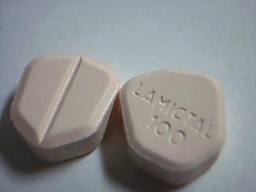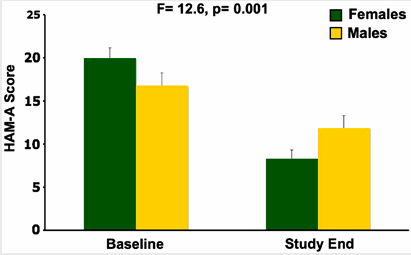Lamotrigine Effective Adjunct for Lithium in Bipolar Disorder
 In a long-term study of bipolar patients taking lithium published in Bipolar Disorders last year, the addition of lamotrigine (or paroxetine for those who did not respond to lamotrigine) was significantly better than the addition of placebo. Patients taking lamotrigine with lithium averaged 10 months until a recurrence of a depressive or manic episode, while patients taking placebo with lithium averaged 3.5 months until an episode.
In a long-term study of bipolar patients taking lithium published in Bipolar Disorders last year, the addition of lamotrigine (or paroxetine for those who did not respond to lamotrigine) was significantly better than the addition of placebo. Patients taking lamotrigine with lithium averaged 10 months until a recurrence of a depressive or manic episode, while patients taking placebo with lithium averaged 3.5 months until an episode.
Lithium Linked to Longer Lifespan in Humans (and Worms)
 An article published in the European Journal of Nutrition last year suggests that higher trace levels of lithium found naturally in drinking water in some environments are linked to longer lifespans. The authors conclude that lithium has some anti-aging properties.
An article published in the European Journal of Nutrition last year suggests that higher trace levels of lithium found naturally in drinking water in some environments are linked to longer lifespans. The authors conclude that lithium has some anti-aging properties.
We’ve written before about the cognitive benefits of small doses of lithium.
Trans-Fats Linked to Depression Risk
 Research published last year showed that people with diets that contain high amounts of trans-fats are at greater risk for depression than people with diets higher in monounsaturated fatty acids (MUFAs) and polyunsaturated fatty acids (PUFAs).
Research published last year showed that people with diets that contain high amounts of trans-fats are at greater risk for depression than people with diets higher in monounsaturated fatty acids (MUFAs) and polyunsaturated fatty acids (PUFAs).
Medscape Medical News reported some tips from lead author of the study, Almudena Sánchez-Villegas, PhD: “The results were not surprising [and] I think the message is clear: ‘try to eat healthy.'”
“Avoid some types of fats, such as trans and saturated fatty acids, and increase the intake of polyunsaturated and monounsaturated fat; it’s better to consume olive oil than margarine or butter, better to use low-fat dairy than high-fat dairy, and better to eat fish than to consume meat or meat products; avoid fast and processed foods and commercial bakery; and try to increase your consumption of fruits, vegetables, and nuts,” she said.
We’ve written before about diet.
Tricyclic Antidepressants Linked to Cardiovascular Disease
 Research from 2010 shows that tricyclic antidepressants (TCAs) are linked to 35% greater risk for cardiovascular disease, while selective serotonin reuptake inhibitors (SSRIs) were not shown to confer any extra cardiovascular risks.
Research from 2010 shows that tricyclic antidepressants (TCAs) are linked to 35% greater risk for cardiovascular disease, while selective serotonin reuptake inhibitors (SSRIs) were not shown to confer any extra cardiovascular risks.
Editor’s Note: This is another one of many reasons to use second generation antidepressants such as the SSRIs and bupropion instead of the first generation tricyclics. The TCAs have more side effects, are more dangerous in overdose, are not indicated for children or adolescents, and are more likely to cause switches into mania in individuals with bipolar disorder than the newer ADs.
Aspirin May Help Reduce Schizophrenia Symptoms
An article by Laan et al. published in the Journal of Clinical Psychiatry in 2010 suggested that aspirin may reduce symptoms of schizophrenia spetrum disorders in patients being treated with antipsychotics.
Aspirin is an anti-inflammatory drug. We’ve written before about the possible use of aspirin in bipolar disorder and about the role of inflammation in mental illness.
Among Bipolar Patients, Women Spend More Time Depressed Than Men Do
An article by Lori Altshuler et al. (including this editor Robert M. Post) published in the American Journal of Psychiatry in 2010 presents research that among bipolar patients studied over a period of 7 years, women spent more time than men depressed. Women had higher rates of rapid cycling and of anxiety disorders, both of which were associated to higher rates of depression.

Proportion of Time Spent Ill During Clinical Visits for Women and Men With Bipolar I or II Disorder (N=711)aaWomen and men, 35.6% compared with 28.7% of visits depressed; 50.4% compared with 56.9% of visits euthymic; 14.1% compared with 14.4% of visits hypomanic or manic.
Scopolamine Produces Larger Antidepressant and Antianxiety Effects in Women Than in Men
In a study published in Neuropscyhopharmacology, three sessions of intravenous scopolamine (4µg/kg over 15 minutes) led to rapid antidepressant response in both men and women, but the magnitude of response was larger in women. Women also experienced significant reduction in anxiety, as seen below:
Editor’s Note: Scopolamine is a potent blocker of acetylcholine receptors of the muscarinic type. This can cause side effects such as dry mouth and constipation. However, when given intravenously, scopolamine produces rapid onset of antidepressant effects in both bipolar and unipolar depressed patients. This study suggests that the drug may be even more effective in women.
Uric Acid Increases During Mania
At the 65th Annual Scientific Convention of the Society of Biological Psychiatry this year, Giacomo Salvadore reported that significantly higher levels of uric acid are found in patients with mania compared with normal controls.
Editor’s note: This study was particularly interesting because there was a highly significant difference between patients and controls, with very few values overlapping. The data suggest the possibility that uric acid may be a useful biological marker for mania, and is one that should be studied in childhood-onset bipolar illness to determine whether uric acid is a marker for mania in children as well.
Allopurinol, a widely used treatment for gout that reduces levels of uric acid in the blood, is an effective antimanic agent (based on data from two placebo-controlled studies, one by Machado-Vieira et al. and one by Akhondzadeh et al.). The new data on uric acid raise the possibility that high levels of uric acid may be a specific predictor of responsiveness to Allopurinol, although this hypothesis has not yet been explored.
In an article by Chung et al. just published in Psychiatry Research, it was reported that in a very large epidemiological study in Taiwan, patients with bipolar disorder have increased risk of gout.
Bipolar Disorder Worse in US than Europe
New research shows that there are more early onsets of illness and more difficult courses of bipolar illness in the US than in the Netherlands or Germany.
This editor was invited to give a plenary presentation at the 4th Biennial Conference of the International Society for Bipolar Disorders in Sao Paulo, Brazil in March. The talk, titled “A greater incidence of early onset bipolar illness and poor prognosis factors in patients in the US compared with those in The Netherlands and Germany,” was based on studies in our Bipolar Collaborative Network.
We found that patients who were studied and treated at four sites in the US (Los Angeles, Dallas, Cincinnati, and Bethesda) had more poor-prognosis factors and indices of difficult courses of bipolar illness compared with patients studied in the same fashion at three sites in Utrecht, the Netherlands and Freiberg and Munich, Germany. We presented some of these data in a preliminary report in the British Journal of Psychiatry in 2008 and further analyzed these data for an article published last year in the Journal of Clinical Psychiatry. Read more
Almost 40% of Children with Bipolar Disorder May Not Receive Necessary Treatment
 An article by Geller et al. in Bipolar Disorders last year illustrates the crisis in the treatment of childhood-onset bipolar illness in the US. The article indicates that almost 40% of the children with a credible diagnosis of bipolar disorder in this study never received anything near the appropriate treatment for their illness.
An article by Geller et al. in Bipolar Disorders last year illustrates the crisis in the treatment of childhood-onset bipolar illness in the US. The article indicates that almost 40% of the children with a credible diagnosis of bipolar disorder in this study never received anything near the appropriate treatment for their illness.
It is unfortunate when children fail to receive appropriate treatment because of ambiguity about a diagnosis, but it is even more frustrating when one of the world’s experts makes a diagnosis, and a child still fails to receive treatment based on consensus guidelines.
Over 8 years of follow-up treatment in their communities, these very ill children not only did not receive helpful drugs such as atypical antipsychotics or mood stabilizers, but they often received treatments that can be counterproductive, such as antidepressants or psychomotor stimulants. Those children who did receive appropriate treatment with lithium fared better and recovered significantly earlier than the others. Read more




